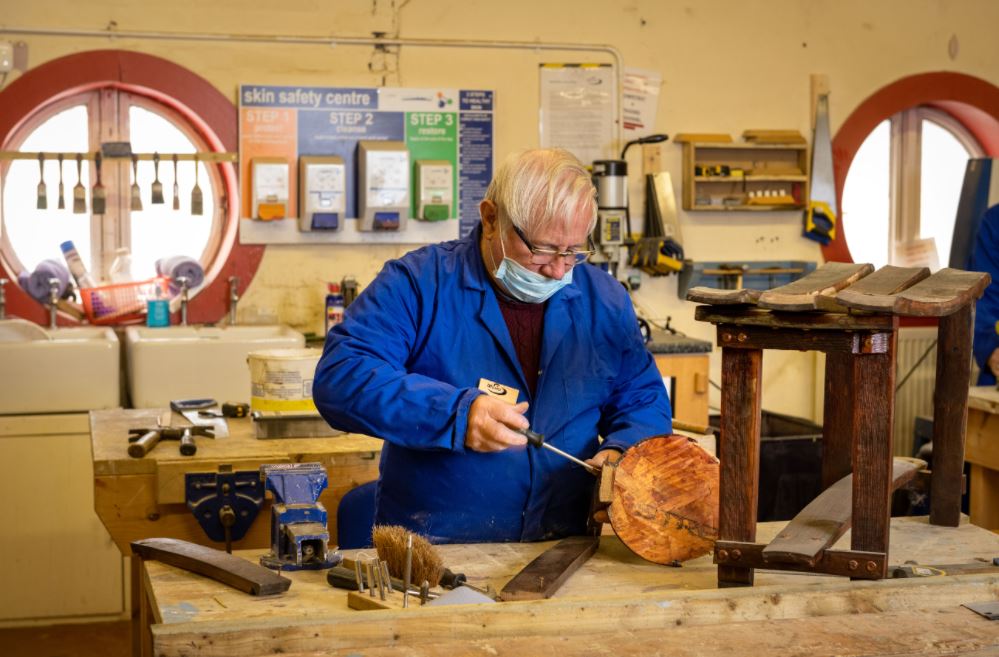
Glasgow Caledonian University has launched a new ‘toolkit’ to help increase the number of Men’s Sheds across the UK after research showed they improve the mental and social wellbeing of older men.
The community spaces offer the chance for men to take part in practical activities, such as woodwork, metalwork, model making or gardening, and are credited with tackling loneliness and social isolation.
Originating in Australia in the 1990s, the number of Sheds in Scotland has increased from one in 2013 to more than 190 today. There are more than 1500 across the UK and Ireland.
Researchers at GCU have been working with Men’s Sheds in Scotland to make the movement financially and socially sustainable, as part of a project backed by the National Lottery Community Fund.
It’s resulted in a new ‘toolkit’ for communities, a guide full of information on how to access funding, source sites, set up committees, run services and offer social activities.
Dr Danielle Hutcheon, research associate at the Yunus Centre for Social Business and Health at GCU, said: “The Sheds offered a lifeline for a lot of people struggling with social isolation and loneliness, especially for men who live alone or are carers.
“What we’ve seen with the Sheds being closed, since March last year, is a real decline in men’s health and wellbeing.
“A lot of the Shedders we spoke to only left the house a couple of times a week to go to the shop or to go to the Men’s Shed. That was the only social contact they had throughout the week.
“Going to the Shed gives a lot of the men a sense of purpose, they treat it almost like a job. It gives them a sense of confidence and value in their lives that they didn’t have before.
“The key to the success of the Men’s Sheds is men’s ability to talk ‘shoulder to shoulder’, while doing a task, rather than sitting face to face in a lunch club or a pub. It’s a relaxed, informal, welcoming environment.”
The toolkit, created in partnership with a range of stakeholders, including the Scottish Men’s Shed Association, Scottish Government, and Age Scotland, will be made available throughout the UK and Ireland.
Dr Hutcheon added: “It comes at an important time. There is a lot of competition for funding at the moment. The toolkit will hopefully help Sheds expand, survive and sustain.
“There’s no doubt the Sheds are having a positive impact on the health and wellbeing of a hard to reach group of men.”
Case study

Bill Core is a co-founder and trustee of Barrhead Men’s Shed, which opened in 2014. He’s 78-years-old and used to work in the furniture trade.
Barrhead’s Shed has 58 members and is based in an industrial unit in the town.
He said: “When I was semi-retired, I remember sitting in the house fed-up, thinking to myself what is my life going to be like when I’m fully retired? What the hell am I going to do?
“It’s fine in the summer if you can get out and do things but, in the winter, when the weather is bad, it can feel as if the walls are closing in. You find yourself looking up into the sky and thinking how long do I have before I’m up there?
“The Shed gave me a purpose to get up in the morning, it was a place to go to meet people like myself, keep busy, have a laugh and enjoy myself.
“The guys look forward to coming and arrive with a smile on their face and leave with a smile on their face.
“You get satisfaction from helping other people, from keeping minds active. A lot of members had high powered jobs in the past, there’s a real cross-section of society.
“I thoroughly enjoy making clocks from chunks of wood. I get an immense amount of satisfaction from it. Some of the stuff we’ve produced has been donated to local schools and nurseries, so the whole community is benefiting from the Shed.
“If anyone is sitting at home and thinking they would like to come along my advice would be put on your coat and do it. You won’t regret it, it will change your life for the better.”

Comments are closed.